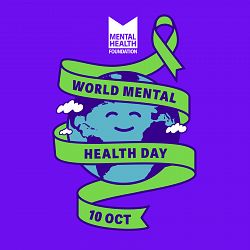Today is World Mental Health Day!
Today (10 October) is World Mental Health Day 2024, and this year's theme set by the World Federation of Mental Health is workplace mental health.
The aim of the day is for everyone to come together to talk about mental health and show everyone that mental health matters, as talking about our mental health can help us cope with life's ups and downs.
This years theme highlights the importance of addressing mental health and wellbeing in the workplace, for the benefit of people, organisations and communications.
Mental health at work
Work can have a huge impact on our mental health. The positive impact work can have on our mental health includes:
- giving us a sense of purpose;
- boosting our self-worth; and
- providing opportunities to connect with others.
However it can also be a source of stress and anxiety, and can contribute to, develop or worsen mental health problems.
Key statistics on mental health in the workplace include that:
- 15% of UK workers are estimated to have an existing mental health condition;
- 875,000 workers were suffering from work-related stress, depression and anxiety in 2022/23;
- mental health was the 5th most common reason for sickness absence in 2022.
Many people spend most of their time working, whether that is in the community, in an office, workshop, at home, or many other workplaces. That is why it is so important that our workplace supports our mental health, helping us get the mental health benefits of work, while reducing the negative impact.
There are many things that contribute to a positive mental health workplace, including:
- providing staff training on mental health;
- tackling discrimination and bullying;
- supporting open conversations about mental health.
Talking about mental health
Talking is good for your mental health, and talking about mental health is important.
But starting a conversation isn't always easy, so the Mental Health Foundation has provided tips on how to talk about how you are feeling, or check in with someone you care about.
Tips to talk about your mental health include:
- choose someone you trust to talk to - this might be a friend, family member or colleague, or you might be more comfortable talking to someone you do not know, such as a support helpline;
- think about the best place to talk - it is important to choose a place where you feel comfortable enough to open-up, which might be somewhere private where you will not be disturbed, or you also might want to talk while you do an activity like walking;
- prepare yourself for their reaction - hopefully you will have a good experience when you open-up to someone, but there is a chance they may not react the way you hope, which may be for different reasons like they may be worried or not fully understand, and if that is the case try to give them time to process what you have told them.
Tips to talk to someone about their mental health include:
- find a good space to talk without distractions - if you are worried about someone, try to find a place where you know you can have a conversation without being interrupted, and make sure to give them your full attention away from your phones or work laptops;
- listen and ask questions - listening can be one of the most valuable ways to be there for someone and showing them that you are actively listening by facing them, making eye contact, not interrupting, and by asking questions that can help you clarify what they mean and also show that you are listening, as long as they are relevant to what they are saying and not changing the subject;
- ask how you can help or make suggestions, rather than telling them what to do next - they might want support with making a GP appointment, help around the house, or just for you to keep things normal and chat about what is going on in your life.
Get involved
Ways to get involved in World Mental Health Day includes:
- use the day to check in with your friends, family, peers, or colleagues and start a conversation;
- attend mental health workshops, either online or face to face;
- share mental health resources, articles and helpline information on social media and with your network;
- support mental health organisations by considering donating or volunteering with organisations dedicated to mental health advocacy and support;
- practice self-care that promote your own mental well-being such as mindfulness, exercise or journalling;
- celebrate with a Tea & Talk, which you can download your pack for here;
- call on the UK government to make mental health a priority by joining Mind's "No Mind Left Behind" campaign.
For more information on this subject, see:

